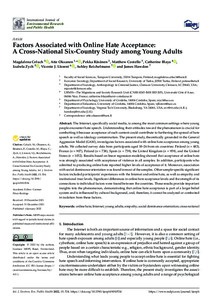Factors Associated with Online Hate Acceptance: A Cross-National Six-Country Study among Young Adults
Celuch Magdalena; Oksanen Atte; Räsänen Pekka; Costello Matthew; Blaya Catherine; Zych Izabela; Llorent Vicente J.; Reichelmann Ashley; Hawdon James
https://urn.fi/URN:NBN:fi-fe2022021619384
Tiivistelmä
The Internet, specifically social media, is among the most common settings where young people encounter hate speech. Understanding their attitudes toward the phenomenon is crucial for combatting it because acceptance of such content could contribute to furthering the spread of hate speech as well as ideology contamination. The present study, theoretically grounded in the General Aggression Model (GAM), investigates factors associated with online hate acceptance among young adults. We collected survey data from participants aged 18–26 from six countries: Finland (n = 483), France (n = 907), Poland (n = 738), Spain (n = 739), the United Kingdom (n = 959), and the United States (n = 1052). Results based on linear regression modeling showed that acceptance of online hate was strongly associated with acceptance of violence in all samples. In addition, participants who admitted to producing online hate reported higher levels of acceptance of it. Moreover, association with social dominance orientation was found in most of the samples. Other sample-specific significant factors included participants’ experiences with the Internet and online hate, as well as empathy and institutional trust levels. Significant differences in online hate acceptance levels and the strength of its connections to individual factors were found between the countries. These results provide important insights into the phenomenon, demonstrating that online hate acceptance is part of a larger belief system and is influenced by cultural background, and, therefore, it cannot be analyzed or combatted in isolation from these factors.
Kokoelmat
- Rinnakkaistallenteet [29337]
